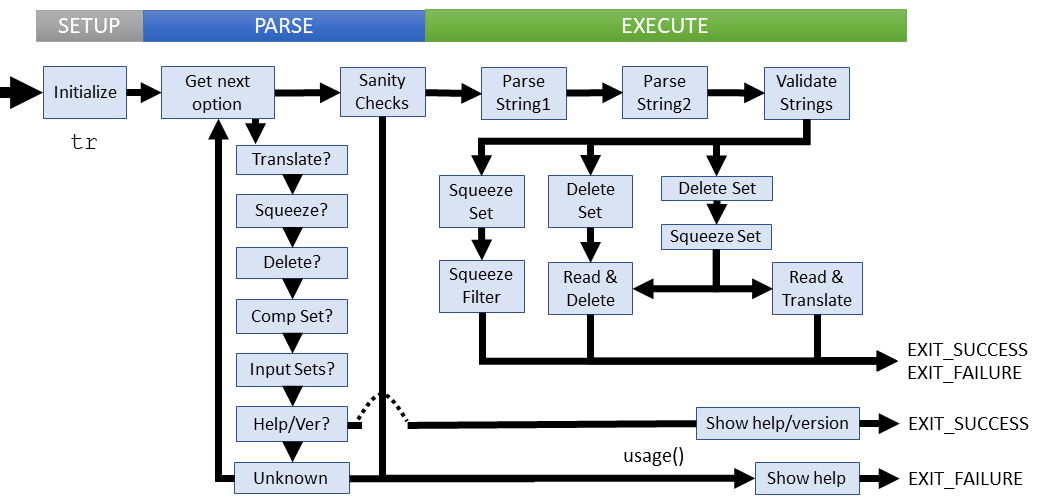[GNU Manual] [POSIX requirement] [Linux man] [FreeBSD man]

Summary
tr - translate, squeeze, and/or delete characters
Lines of code: 1915
Principal syscall: write()
Support syscalls: close(), fadvise()
Options: 12 (6 short, 6 long)
Descended from tr introduced in Version 5 UNIX (1974)
Added to Shellutils in November 1992 [First version]
Number of revisions: 204
append_char_class()- Adds a character class (alpha, digits) to the Spec_listappend_equiv_class()- Adds a equivalence class (?) to the Spec_listappend_normal_char()- Adds a regular character to the Spec_listappend_range()- Adds a range (a-z) to the Spec_listappend_repeated_char()- Adds a character Kleene star to the Spec_listbuild_spec_list()- Creates a Spec_list in two passes (unescaping and construction)card_of_complement()- Computes set cardinalityes_free()- Frees any allocation within an E_stringfind_bracketed_repeat()- Handles bracketed repeats '[c*3]' while building a Spec_listfind_closing_delim()- Finds matching delimiters (i.e. ':" or "=")get_next()- Returns the next character from the processed Spec_listget_spec_stats()- Updates the given Spec_list statisticsget_s1_spec_stats()- Updates Spec_list statistics for string1get_s2_spec_stats()- Updates Spec_list statistics for string2homogeneous_spec_list()- Tests a Spec_list for one type of entryis_char_class_member()- Tests a character against a List_element char_classis_equiv_class_member()- Tests a character against a List_element equiv_codelook_up_char_class()- Finds a character in the global class name arraymake_printable_char()- Allocates a character in printable form (escaped if necessary)make_printable_str()- Allocates a new string with all characters printableparse_str()- Processes escapes and builds the Spec_listplain_read()- Reads from STDIN with error reportingread_and_delete()- The top-level delete procedure for trread_and_xlate()- The top-level translate procedure for trset_initialize()- Initializes membership sets (squeeze set, delete set)skip_construct()- Skip the current construct in the Spec_listspec_init()- Initializes an empty Spec_listsqueeze_filter()- The top level squeeze procedure for trstar_digits_closebracket()- Tests the target character for a final digit in a repeatstring2_extend()- Grows the string2 Spec_list to match string1's listunquote()- Converts escaped characters to their true form (unescaped)validate()- Tests string1 and string2 for compatibility with execution modevalidate_case_classes()- Tests matching case classes for Spec_list 1 and 2.
die()- Exit with mandatory non-zero error and message to stderrerror()- Outputs error message to standard error with possible process termination
Setup
Throughout the source code and this page, we refer to two strings, string1 and string2. These are the user-provided argument strings.
There are a few important structures to know in tr:
E_string- A separate escaped representation of input arugment stringsList_element- One part of a descriptive range of stringsSpec_list- Describes individual elements of an argument string
tr keeps five important flags as globals to denote the operating mode:
complement- Flag to consider the complement of set1 (all characters not in the given string1)delete- Flag to remove characters identified by the delete set (-d)squeeze_repeats- Flag to suppress repeated characters (-s)translating- Flag set if we're translating (not deleting and two string sets provided)truncate_set1- Flag set if excess characters in string1 should be ignored (-t)
main() introduces a few local variables:
buf1- Buffer for Spec_list of string1buf2- Buffer for Spec_list of string2c- The character for the next option to processmax_operands- The maximum number of user input stringsmin_operands- The minimum number of user input stringsnon_option_args- The number of arguments (strings) provided by the users1- The Spec_list created from string1s2- The Spec_list created from string2
Parsing
Parsing answers the following questions to define the execution parameters
- What behaviors do we want? Translation? Deletion? Squeezing?
- What are the matching character sets for the specified operation?
Parsing failures
These failure cases are explicitly checked:
- Not providing two strings for deleting, squeezing, or translating
- Proving two strings when deleting without squeezing
- Providing any other unexpected number of non-option argument
- Unknown option used
User specified parsing failures result in a short error message followed by the usage instructions. Access related parsing errors die with an error message.
Execution
tr execution branches among three procedures: Translating (read_and_xlate()), Squeezing (squeeze_filter()), and Deleting (read_and_delete()). Before any of the procedures are invoked, the user input strings need to be parsed to build corresponding Spec_lists. Depending on the operation, delete and squeeze sets may be initialized, possibly basd on set complements. name need to be The overall procedure looks like this:
- Parse the first user input string (string1) to create a Spec_list. This will always exist
- Parse the first user input string (string2) to create a Spec_list. This is usually needed except in delete, non-squeeze operations
- Validate the Spec_lists
- Initialize required sets and perform desired procedure. These are as follows:
- Squeeze only:
- Initialize squeeze set
- Perform
squeeze_filter()withplain_read()
- Delete only:
- Initialize delete set
- Perform
read_and_delete()
- Squeeze and delete:
- Initialize delete set
- Initialize squeeze set
- Perform
squeeze_filter()withread_and_delete()
- Translate complement:
- Initialize complement set
- Perform simple mapping with translation array,
xlate[]
- Translate and squeeze:
- Perform simple mapping with translation array,
xlate[] - Initialize squeeze set
- Perform
squeeze_filter()withread_and_xlate()
- Perform simple mapping with translation array,
- Close standard input
Failure cases:
- Specified strings have too many characters (validation error)
- Unable to read from STDIN
- Unable to write to STDOUT
All failures at this stage output an error message to STDERR and return without displaying usage help